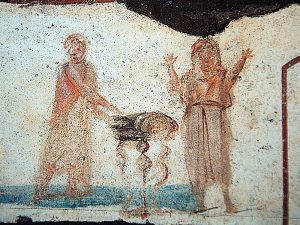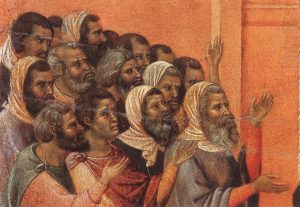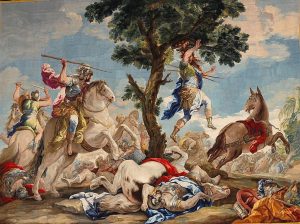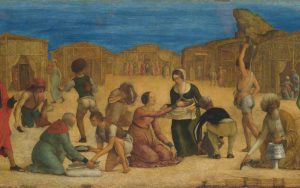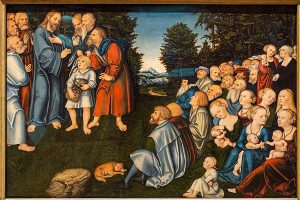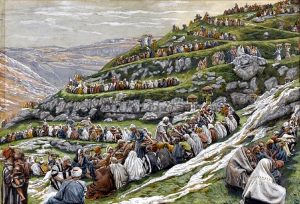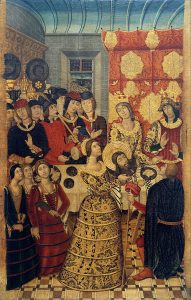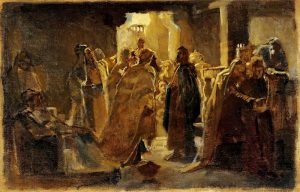Thoughts on Sunday’s Lessons for Sept. 5, 2021
First Reading (Track One): Proverbs 22:1-2, 8-9, 22-23
God feeds the hungry, gives drink to the thirsty, heals those who are ailing, stands with those who are oppressed, and calls on us to do the same. This call for distributive justice resonates through both lectionary tracks in Sunday’s readings.
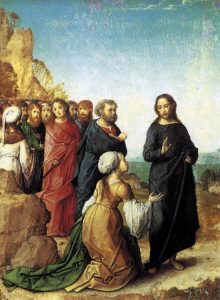
Christ and the Canaanite Woman (c.1500), oil painting on panel by Juan de Flandes (1450-1519). Royal Palace of Madrid. (Click image to enlarge.)
Our Track One first reading turns to the book of Proverbs, another work of wisdom literature that once was thought to have been the work of King Solomon himself. Much of its wisdom seems as applicable now as it did 2,500 years ago. Phrased in memorable poetic rhythms, it reminds us that God’s covenant with the people demands solidarity with the poor: “Do not rob the poor because they are poor, or crush the afflicted at the gate; for the Lord pleads their cause and despoils of life those who despoil them.”
First Reading (Track Two): Isaiah 35:4-7a
In Lectionary Track Two, also, the call for righteousness and justice resonates through this week’s readings. Indeed, distributive justice is a consistent theme throughout the prophets. The Prophet Isaiah robustly sounds the call in this first reading. Speaking from exile in Babylon, Isaiah urges the people to remain strong and fearless as God comes to save them and their land. Even though the fortunes of war have sent you into exile and separated you from home and Temple, Isaiah assures the people, God is coming with healing and comfort and will lead you back. God will open your eyes and ears as Earth and waters and all creation are restored in speech and sing their joy.
Psalm (Track One): Psalm 125
Psalm 125 is one of the shortest of the psalms, with just five verses, but it concisely celebrates the justice of God’s covenant with the people. Those who trust in God, the Psalmist sings, can no more be moved than Zion, the mountain on which the Temple stands. God surrounds the people just as the hills rise around Jerusalem: fixed and strong forever. God rewards those who are good and pure in heart, the brief psalm concludes; but those who turn to evil ways will be sent away with all the evildoers.
Psalm (Track Two): Psalm 146
Echoing Isaiah’s celebration of God’s justice, Psalm 146 sings the praise of God who cares for God’s people and loves us deeply. Look beyond earthly rulers, the Psalmist calls us; they cannot help us in the long run. Rather, place our hope in God, creator of the earth and all that is in it, who reigns forever. God’s caring justice favors the poor and the oppressed, those most in need: Hungry people, prisoners. those who are blind; the stranger, the widow, the orphan; those weighed down by life’s load. In caring for the least among us – as Jesus, too, calls on us to do – God cares for us all.
Second Reading: James 2:1-17
James’ rich advice this week should speak as clearly to us today as it did to its first-century audience. What if a homeless person showed up at church on a Sunday morning, obviously in need of a haircut and a bath? Would we greet that person warmly? Would we greet them at the Peace with a friendly smile? Would we invite them to join us for brunch afterward? God calls us to love all our neighbors – both rich and poor – James gently reminds us. Speaking kindly to our poor and hungry neighbors is not enough; we must feed and clothe them too. Faith without such works, says James, is dead.
Gospel: Mark 7:24-37
This may be one of the most troubling of all the Gospel stories. Jesus has gone off by himself, traveling alone in Tyre, a coastal region populated by Israel’s enemies. It is surprising that Jesus is there. It is surprising that a woman of the region, who somehow knows of his healing powers, asks for help. And it is frankly shocking that Jesus dismisses her with a startling slur, likening the woman and her daughter to little dogs. Is this a rare glimpse into Jesus’ fully human side? Or can we explain it away as a later addition to the Gospel, intended to show that Jesus came to see his mission as wider than Israel alone? In any case, we see how the woman’s faith empowered her to challenge Jesus, and we see Jesus listening, learning, and then heals her child. And then he goes on down the road to restore hearing and speech to a deaf Gentile man.

